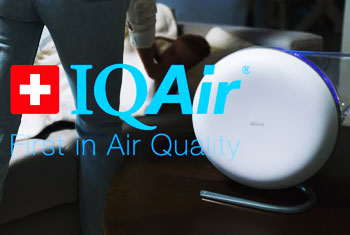With air pollution on the rise, indoor air quality has become a major concern for many homeowners. Air purifiers provide a solution by filtering out pollutants, allergens, and odors. Two popular brands, IQair and Molekule, promise clean and healthy indoor air but use different technologies to achieve it.
So which one is better? In this comprehensive guide, we’ll compare Iqair and Molekule air purifiers to help you decide.
A Brief Comparison Table
| Feature | IQair | Molekule |
| Technology | HEPA filter | PECO filter |
| Particle filtration | Removes 99.97% down to 0.3 microns | Good down to 0.1 microns |
| Gases & VOCs | Not effective | Destroys at molecular level |
| Filter life | Annual replacement | Replaced every 6 months |
| CADR rating | Up to 350 | Around 190 |
| Coverage area | 1,125 sq. ft. | 600 sq. ft. |
| Noise level | 22 – 56 dB | 31 – 55 dB |
| Design | Functional, simple | Sleek, modern |
| Cost | $800 – $1,200 | $799 – $1,199 |
| Warranty | 5 years on parts, 10 years on housing | 2 years on unit, 10 years on housing |
An Overview of IQair And Molekule

IQair air purifiers use a traditional HEPA filter to remove 99.97% of particles down to 0.3 microns. This includes allergens from pollen, dander, mold, and dust. The HyperHEPA filter is also effective against bacteria and viruses. IQair systems have up to 6 fan speeds so you can adjust airflow as needed. They are excellent for whole home air purification.
Molekule takes a completely different approach with its proprietary Photo Electrochemical Oxidation (PECO) technology. Instead of simply trapping pollutants like HEPA filters, the PECO destroys them at a molecular level. This allows Molekule to eliminate VOCs, chemicals, allergens, bacteria, viruses, and mold from the air. The sleek, futuristic design makes Molekule models ideal for single rooms.
Filtration Technology Compared
Let’s take a deeper look at how these two technologies work:
HEPA Filtration (IQair)
HEPA (High Efficiency Particulate Air) filters use a dense mesh of fiberglass or plastic fibers to mechanically trap particles. The fibers are tightly woven and very fine, allowing HEPA filters to capture over 99.97% of particles larger than 0.3 microns through diffusion and interception. This includes fine particles like smoke, pet dander, pollen, mold, bacteria, and viruses. The trapped particles remain stuck in the filter instead of recirculating through the air.
However, HEPA filters have limitations:
- Not effective at removing odors, gases, or VOCs
- Must be replaced annually for optimum performance
- Can allow some ultrafine particles like viruses to pass through

PECO Technology (Molekule)
PECO (Photo Electrochemical Oxidation) uses UV light and a nano-coated filter to destroy pollutants, including VOCs, bacteria, viruses, and mold, at a molecular level. Here’s how it works in 4 steps:
- Adsorption: As air passes through the filter, pollutants stick to the nano-coating on the surface.
- Oxidation: The UV-A light activates the nano-coated filter, creating oxidation that breaks down pollutants and converts them into harmless compounds like CO2 and H2O.
- Mineralization: Minerals in the filter transform any remaining bigger particles into inert salts and minerals.
- Collection: These inert byproducts remain trapped on the filter surface.
PECO does not just collect pollutants but oxidizes and destroys them completely. However, the PECO filter needs replacing approximately every 6 months.
Ease Of Use
Both IQair and Molekule systems are simple to operate. Here’s a quick comparison:
IQair
- Touch button controls on unit
- Remote control included
- LED displays show fan speed, filter life, and air quality
- Easy filter replacement
Molekule
- Touchscreen display with intuitive interface
- App for smartphone control
- Indicator lights display filter status and air quality
- Automated filter delivery when replacement needed
Molekule air purifiers provide more convenience with app connectivity and auto-delivery of replacement filters when required. But Iqair models also let you monitor air quality and change settings easily on the unit itself.
Also Read: Comparison Between Blueair And Rabbit Air.
Coverage And Room Size
Another important consideration is the unit’s CADR (Clean Air Delivery Rate) and coverage capacity:
IQair
- Designed to clean large spaces up to 1,125 sq. ft.
- Can effectively purify entire homes
- Models with HyperHEPA filter have high 300+ CADR rating
Molekule
- Ideal for single rooms up to 600 sq. ft.
- Lower CADR rating around 190
- Air Multiplier fans help project purified air farther
- Multiple units needed to cover whole home
If you want to purify the air in a large open floor plan or throughout your whole house, IQair is the better choice. For one bedroom or smaller rooms, a Molekule unit is sufficient.
Noise Levels
Excessive noise can be annoying for some users. Here’s how IQair and Molekule models compare:
IQair
- Noise levels from 22 dB(A) on lowest fan speed
- Up to 56 dB(A) on highest setting
- Overall quiet operation
Molekule
- Ranges from 31 dB(A) to 55 dB(A)
- Generally quiet but higher minimum noise level
- Silent mode at 34 dB(A) available on some models
At their lowest speeds, both brands have quiet operation around 22 to 31 dB(A). Molekule air purifiers tend to have higher minimum noise levels, while Iqair systems can run quieter on the lowest fan setting. But Molekule offers a silent mode on some units for very unobtrusive and relaxing purification.
Appearance And Design
Let’s examine the aesthetics and design:
IQair
- Functional, box-shaped design
- Made from durable hard plastic
- Available in neutral colors like black and white
Molekule
- Sleek and cylindrical shape
- Premium materials like aluminum and leather
- Contemporary style in colors like silver, black, and white
For those that value form and appearance, Molekule air purifiers look more stylish and are designed to fit seamlessly into modern homes. But IQair units have a simple, fuss-free look that blends easily into any space.
Also Read: Choose Between Molekule And Levoit.
Special Features
Beyond just the core filtration, here are some extra features found on these air purifiers:
IQair
- VFAST® fan technology increases energy efficiency
- Auto Mode adjusts fan speed based on air quality
- Timer, filter life LED, and other alerts
- HyperHEPA filter for bacteria and viruses
Molekule
- Dual airflow channels avoid leaks and optimize purification
- Auto Mode adjusts fan speed based on particle levels
- Real-time air quality monitoring and notifications
- Air Multiplier blows purified air farther
Molekule’s air quality sensor and dual channel system offer added convenience, while Iqair provides the ultimate filtration even for viruses. But both brands offer useful auto modes, alerts, and other handy features.
Cost Comparison
Let’s look at the cost and value offered by these two brands:
IQair
- Models range from $800 to $1,200
- Excellent value for large rooms and whole homes
- HEPA filters cost around $120 per year
Also watch the video!
Molekule
- Units range from $799 to $1,199
- More economical for single rooms up to 600 sq ft
- PECO filters cost roughly $130 every 6 months
Molekule air purifiers are ideal for smaller spaces, while larger IQair models offer better value to purify the air throughout your home. The PECO filters used by Molekule need replacing twice yearly, making long term operation more expensive.
Warranties
The warranty coverage also differs:
- IQair – 5 years on parts, 10 years on housing
- Molekule – 2 years on entire unit, 10 years on housing only
Iqair provides a longer 5-year warranty on the internal components. But Molekule offers 10 years of coverage on the outer housing for both brands.
Frequently Asked Questions (FAQ)
Molekule faced controversy after some misleading marketing claims and paid reviews. The National Advertising Review Board required Molekule to back up certain statements about the science behind its PECO technology. While Molekule air purifiers do work very well, some of the marketing was overstated.
While Iqair air purifiers are expensive, they are absolutely worth the price for whole home air purification. With large coverage capacities and the proven effectiveness of HEPA filtration, Iqair models provide robust air cleaning. The filters last 12+ months and energy efficient motors keep operation costs low. So you get great value for money.
As an innovative brand with PECO technology, Molekule does not have many direct competitors. However, brands like Honeywell, Coway, Austin Air, and Blueair make effective air purifiers for home use and target similar consumer markets. Iqair is probably Molekule’s closest competitor in terms of features and pricing.
For small rooms, quality HEPA air purifiers can work well as an alternative to Molekule. Options like Austin Air and Blueair have models designed for single rooms up to 500 sq. ft. that provide excellent particulate filtration. While they won’t destroy VOCs like Molekule, these alternatives cost less while still cleaning the air effectively.
Also Read: Is Coway Better Than Dyson?
Final Verdict
So which brand is better for your needs?
If you want advanced PECO technology for small spaces, Molekule is the winner. The innovative particulate destruction, silent mode, and stylish design make Molekule a great choice for bedrooms, offices, and other compact rooms.
For large open spaces and whole home coverage, IQair air purifiers come out on top. With bigger units and the tried and true performance of HEPA filtration, IQair models provide robust air purification at a bit more affordable price point. Ultimately, choosing between IQair and Molekule depends on your space size, features needed, and budget.
Both brands deliver excellent air filtration with smart conveniences. Focus on whether complete pollutant destruction or maximum coverage for your square footage matters most to make the right selection. With clean air benefits for health and comfort, you can’t go wrong with either IQair or Molekule.
